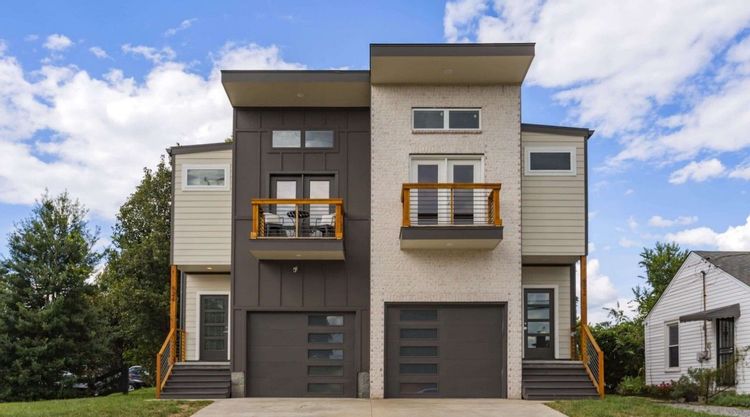2025 Guide to Buying a Horizontal Property Regime (HPR)


by Tyler Forte
What Is An HPR In Real Estate?
A Horizontal Property Regimes, or HPR, is a type of zoning policy that allows for two houses to be built on land that was formally only zoned for just one house. The end result is, instead of being short and wide, the houses are constructed to be tall and skinny. This is a newer type of construction/building strategy. These homes are most commonly found in up and coming areas where land is at a premium.
Is A Horizontal Property Regime (HPR) The Same As A Planned Urban Development (PUD)?
A horizontal property regime is not the same as a planned urban development or PUD. A PUD is a large community that typically shares a common area and amenities. Typically a PUD will have 100+ individual properties and there will be a community pool, tennis court, outdoor entertainment space, and even a clubhouse.
Whereas, an HPR is typically just two homes, that are both individually owned, on a lot that once accommodated a single-family home. There are limited common amenities, and the properties are governed by an HOA.
What Are The Types Of HPR Real Estate?
HPR attached
An attached horizontal property regime is when two or more homes are connected, wall to wall, without any green separating the home.

HPR detached
A detached horizontal property regime is when a bit of green space separates each home. It's standard for there to be a minimum of 6 feet of green space separating each home. Each home is individually owned, and any common ground is typically maintained according to the homeowners association bylaws.

HPR zero lot line
A zero lot line isn't a common way to deed a property, but there are certainly some on the market. Simply put, a zero lot line is when the home's structure goes right up the property line, leaving no room or property between neighbors.

What Are The Pros To Owning Horizontal Property Regimes?
In Nashville, these properties are becoming increasingly more popular in neighborhoods such as The Nations, East Nashville, Charlotte Park, and Wedgewood Houston. There are many reasons/benefits why someone would be interested in owning an HPR property. These most commonly include:
You'll live in a vibrant community
Many HPRs are built by tearing down a single-family home to make room for two separate HPRs. This is common in areas where there isn't a great deal of space and it's not uncommon to find them near downtown Nashville. If you want to own your own place, but still live in the hustle of the city, considering purchasing a conveniently located horizontal property regime.
Lower maintenance
Unlike owning a single-family home on half an acre, you'll have low maintenance in an HPR property. The owners won't need to dedicate an entire weekend to mowing and mulching their lawn, as the homeowners association will help maintain the various units.
What Are The Cons To Owning An HPR?
Numerous levels of living
HPRs are typically tall and skinny houses, meaning they cannot have everything all on one level. It's not uncommon for an HPR to be 3 stories high. If you aren't comfortable doing a lot of stairs, or, if you want a typical floor plan, you'll have a tough time finding that in an HPR.
Homeowners association (HOA)
Once a master deed is recorded, it establishes an HOA. Every HOA has rules/regulations each owner will need to follow. Part of the joys of owning your own home is being able to do whatever you want to it. Although HPR homeowners associations typically are not as strict as the HOA in a new construction community or condominium complex, it is important to read all of the HOA bylaws before purchasing a property.
Are Horizontal Property Regimes A Good Investment?
Without a doubt, horizontal property regimes are a niche type of property. It doesn't attract as many potential buyers, but those who are interested in purchasing one are willing to pay top dollar for it.
As shown below, the site built - or single-family home saw a 34% increase when looking at the average sales price per square foot. During the same time period, an attached horizontal property regime saw an increase of 22%, whereas a detached HPR appreciated by 18.5%.
It's clear, single-family homes have appreciated slightly faster over the past five years, but HPRs are typically more expensive when looking at the price per square foot.
As cliche as it sounds, real estate is all about location! More often than not, an HPR is built in a desirable area of town where many folks want to live. There may be a limited amount of space to build single-family homes, but a builder can maximize their profit if they are able to build two or more houses on a property that was previously zoned for a single-family house.
Most commonly, a builder will build two houses on a property, and each unit will have its own owner.
Why Do Builders Like Horizontal Property Regimes?
Builders love horizontal property regimes because it allows them to maximize the profit they make on any particular lot size. For example, if a builder purchases land for $150,000, they may be able to put a single-family home on that lot and sell the property for $400,000. However, if they use various zoning laws in their favor, they could build two or more HRPs. By doing so, two or more houses will now live on this given property, and the builder will be able to sell each unit to two separate owners and generate a greater profit.
The builder may choose to develop two homes and sell each unit for $375,000. Now, instead of having made a $250,000 profit, the builder now makes a $600,000 profit before you add in the construction costs.
As the Nashville area becomes increasingly more popular, builders need to get creative with how they use the land given to accommodate the city's rapid growth. Even when using an HPR, builders are struggling to keep up with the rapid expansion Nashville is experiencing.
About Felix Homes
Felix Homes is where five-star service meets low commissions! To date, we've saved our clients $1,610,738 in commission fees and have earned 120 five-star reviews on Google!
How are we able to offer five-star service AND lower commission fees? It's simple:
- We're an independently owned brokerage – not a franchise which allows us to keep more of the commission we earn.
- By offering a lower commission, more folks want to work with us which means we close more deals. By closing more deals, we can pass more savings along to our customers!
Still not convinced? Read all about our low-commission mission here.
If you have any questions about the state of the market or the home buying/selling process, please feel free to contact us at contact@felixhomes.com or 615-354-5731.






